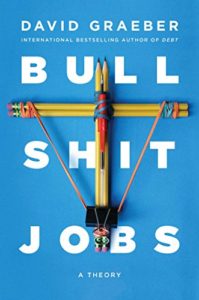 Yesterday (18.09.2018), Marc Tribelhorn, a geographer by education, published a commentary in the Neue Zürcher Zeitung (NZZ), the Swiss quality Newspaper about the
Yesterday (18.09.2018), Marc Tribelhorn, a geographer by education, published a commentary in the Neue Zürcher Zeitung (NZZ), the Swiss quality Newspaper about the  development of ‘Bureaucracy’ in today’s world which resembles a lot of what we observe in modern universities and which is next to continuous budget cuts one of main reasons for a killing work load and crumbling quality of teaching and research. Not very new, but story which is right from the heart of many scientists working at universities and doing their utmost to inspire and educate our future generation and to create the knowledge our society needs to address the problems of tomorrow. Here is my free translation of that brief commentary:
development of ‘Bureaucracy’ in today’s world which resembles a lot of what we observe in modern universities and which is next to continuous budget cuts one of main reasons for a killing work load and crumbling quality of teaching and research. Not very new, but story which is right from the heart of many scientists working at universities and doing their utmost to inspire and educate our future generation and to create the knowledge our society needs to address the problems of tomorrow. Here is my free translation of that brief commentary:
 Those who want to express the discomfort in our service society in one word are well served by the Anglicism: ‘bullshit jobs’. For example, David Graeber, ethnologist, anarchist and professor at the prestigious London School of Economics, described a phenomenon which is not limited to public sector, but can also be found in board rooms of private companies: jobs of which do not seem to make any sense and which you probably will also not miss it if they did not exist. Graeber coined this idea on the basis of the answers to the question ‘What do you do for a living?’ posed while socialising at parties. Increasingly the answers puzzled him when professions like ‘Human Resources Management Consultant’, ‘Regulatory Compliance Manager’ or ‘Senior Compensation & Benefits Specialist’ were
Those who want to express the discomfort in our service society in one word are well served by the Anglicism: ‘bullshit jobs’. For example, David Graeber, ethnologist, anarchist and professor at the prestigious London School of Economics, described a phenomenon which is not limited to public sector, but can also be found in board rooms of private companies: jobs of which do not seem to make any sense and which you probably will also not miss it if they did not exist. Graeber coined this idea on the basis of the answers to the question ‘What do you do for a living?’ posed while socialising at parties. Increasingly the answers puzzled him when professions like ‘Human Resources Management Consultant’, ‘Regulatory Compliance Manager’ or ‘Senior Compensation & Benefits Specialist’ were  mentioned. In England, in a representative study, nearly 40 percent of respondents said they do not contribute anything useful to society through their wage labour. Graeber first wrote an essay and then a book on this issue that caused a stir around the world because they strike a nerve despite the thin empirics: Many contemporaries have the impression that in the administration and in the middle management of companies more and more well-paid people work without being productive in the narrow sense of the word, i.e. without contributing to consumption and investment. Worse yet, the bullshit jobs are not just an expression, but are the drivers of ever more bureaucratic excesses.
mentioned. In England, in a representative study, nearly 40 percent of respondents said they do not contribute anything useful to society through their wage labour. Graeber first wrote an essay and then a book on this issue that caused a stir around the world because they strike a nerve despite the thin empirics: Many contemporaries have the impression that in the administration and in the middle management of companies more and more well-paid people work without being productive in the narrow sense of the word, i.e. without contributing to consumption and investment. Worse yet, the bullshit jobs are not just an expression, but are the drivers of ever more bureaucratic excesses.
 Undoubtedly, more and more activities require more and more time to document the work done and to justify the future work, as the Zurich economics professor Bruno S. Frey stated several years ago. We all know this from our everyday work? Everything is diligently questioned, controlled, administered, optimised and reformed, supervised, outsourced, reintegrated and harmonised – in an endless Möbius loop. Rarely, this results in something tangible and useful, but it always produces a lot of paper and ever more administration. What is sold as a recipe for simplification, streamlining and improving work processes often cause exactly the opposite.
Undoubtedly, more and more activities require more and more time to document the work done and to justify the future work, as the Zurich economics professor Bruno S. Frey stated several years ago. We all know this from our everyday work? Everything is diligently questioned, controlled, administered, optimised and reformed, supervised, outsourced, reintegrated and harmonised – in an endless Möbius loop. Rarely, this results in something tangible and useful, but it always produces a lot of paper and ever more administration. What is sold as a recipe for simplification, streamlining and improving work processes often cause exactly the opposite.
The power of numbers
A prime example is the evaluation, which one can no longer dismiss as a fad, so omnipresent it has become in the modern organisation of labour. In the third decimal place, companies and authorities are now collecting so-called key figures that are supposed to prove, for example, ‘performance’ or the ‘satisfaction’ of the employees. Entire internal departments and an army of external consultants specialise in such ‘monitoring’ in the sense of ‘quality management’. There is nothing that cannot be measured. Only: Not every measurement leads to findings that deserve this name. It’s like with medication, where the dose determines if it is poisonous or not. Not to mention the monstrous ‘evidence-based’ reports, that are produced but not read, but nevertheless are followed by further meetings, debriefings, as well as action plans, regulations, and guide lines. The complaints about the rampant ‘administration’ in all spheres of professional life are fierce and omnipresent. Doctors, teachers, police officers, bank client advisers, nursing experts or scientists, all complain about the protocols, questionnaires and other forms of data collection that would hinder their actual work today.
These are historically and culturally interesting findings. Could it be that in recent decades the way we deal with bureaucratic processes has imperceptibly, but fundamentally changed?
 The concept of bureaucracy, when coined in the 19th century, was limited to actions and functioning of powerful civil servants. The sociologist Max Weber later enthused about the ‘formally most rational form of exercise of power’, an ideal for a lean and efficient organisation that guaranteed standardised processes for modern societies. But soon there were signs of degeneration. The dubious reputation of the bureaucracy, for example, observed by British historian Cyril Northcote Parkinson, who had a keen sense of the absurdities of the world of work. In the mid-1950s, the ‘Darwin of the Manager Age’ (‘Time’
The concept of bureaucracy, when coined in the 19th century, was limited to actions and functioning of powerful civil servants. The sociologist Max Weber later enthused about the ‘formally most rational form of exercise of power’, an ideal for a lean and efficient organisation that guaranteed standardised processes for modern societies. But soon there were signs of degeneration. The dubious reputation of the bureaucracy, for example, observed by British historian Cyril Northcote Parkinson, who had a keen sense of the absurdities of the world of work. In the mid-1950s, the ‘Darwin of the Manager Age’ (‘Time’  magazine) published its famous Parkinson’s Law on Administration, which basically anticipated Graeber’s bullshit job thesis. Firstly: ‘Every employee wishes to increase the number of his subordinates, but not the number of his rivals’. Secondly, ‘Employees create work for each other’. And Parkinson says this work will never end because it will always expand, in the same rate as the time available for it. So the bureaucracy keeps on growing – no matter if its actual tasks are reduced or not.
magazine) published its famous Parkinson’s Law on Administration, which basically anticipated Graeber’s bullshit job thesis. Firstly: ‘Every employee wishes to increase the number of his subordinates, but not the number of his rivals’. Secondly, ‘Employees create work for each other’. And Parkinson says this work will never end because it will always expand, in the same rate as the time available for it. So the bureaucracy keeps on growing – no matter if its actual tasks are reduced or not.
Even digitisation, of which one expected a relief like in the so called paperless office, in reality mainly produced additional administration
Ever since Parkinson’s seminal classic, the state administration of liberal spirits is scolded as a juggernaut, insatiably generating new jobs, fields of activity and idle procedures. Bureaucracy has become a political swearword, and nothing is more popular and easier than tuning into the song of the indignant. But to the chagrin of their critics, bureaucracy has transformed everything that has been designed to stop bureaucracy into even more bureaucracy. Even digitisation, of which one expected a relief like in the so called paperless office, in reality mainly produced additional administration.
Meanwhile, the concept of bureaucracy has become more and more the metaphor for all kinds of meaningless self-employment – even in the private sector. The fact that excessive bureaucracy is not an exclusive phenomenon in public administration was already acknowledged by the analyst Parkinson. Shortly after publication of his laws, the author received enthusiastic letters from business circles: ‘How is it possible that you know our company?’, was asked with a degree of surprise. This already called into question the capitalist master story, according to which the market automatically eliminates the irrationality and inefficiency of economic actors.
«Cover your ass!»
In the private sector, however, on tends to explain the rapid increase in administrative work with state regulatory rage. That is only partially true: in Switzerland alone, the systematic collection of laws by the federal government between 2004 and 2015 grew from 53,958 to 69,354 pages. The world is increasingly interconnected. This also calls for more ordering and coordination, which is why the state increasingly intervenes with laws and regulations in the economic processes. As an example, one can think of the compliance regulations in the banking sector, monitored by countless legally educated employees. And the administrative paperwork that companies incur as a result of such activities is expensive. In 2013, the federal government estimated the direct regulatory costs in the most important economic sectors at around 10 billion francs per year. The Swiss Trade Association even puts it at 50 billion francs.
But the bureaucracy problems in the private sector are also home-made and follow a general social trend: the avoidance of risks, the fear of mistakes and the flight from responsibility. For these reasons, management departments such as controlling, communications, internal legal departments and, of course, HR are flourishing, which has long ceased to be concerned only with employment contracts and conflicts. Everything has to be meticulously transcribed, measured and double-fused in order to be protected against negative headlines or lawsuits, both in private companies as well as in state agencies. ‘Cover your ass’ is the English name for it.
 The emeritus Bernese professor Norbert Thom for economics, who spent decades researching ways of reducing bureaucracy, also observes how the zeitgeist is characterised by the drive to avoid uncertainty and to permanent preservation of evidence. Therefore, with Swiss precision everything is logged, evaluated, quantified and controlled from above, which has led to a massive increase in internal bureaucracy. The corresponding departments would develop a considerable life of their own and grow steadily.
The emeritus Bernese professor Norbert Thom for economics, who spent decades researching ways of reducing bureaucracy, also observes how the zeitgeist is characterised by the drive to avoid uncertainty and to permanent preservation of evidence. Therefore, with Swiss precision everything is logged, evaluated, quantified and controlled from above, which has led to a massive increase in internal bureaucracy. The corresponding departments would develop a considerable life of their own and grow steadily.
 This ‘all risk’ mentality, based on dense regulations, but without any error culture, has consequences that go beyond the loss of efficiency and the immediate cost increases: It smothers the cardinal liberal virtues of employees such as personal responsibility, intrinsic motivation, expertise and common sense. Ultimately, it also undermines the mechanism that, according to sociologist Niklas Luhmann, reduces complexity in modern societies and in companies – trust.
This ‘all risk’ mentality, based on dense regulations, but without any error culture, has consequences that go beyond the loss of efficiency and the immediate cost increases: It smothers the cardinal liberal virtues of employees such as personal responsibility, intrinsic motivation, expertise and common sense. Ultimately, it also undermines the mechanism that, according to sociologist Niklas Luhmann, reduces complexity in modern societies and in companies – trust.
